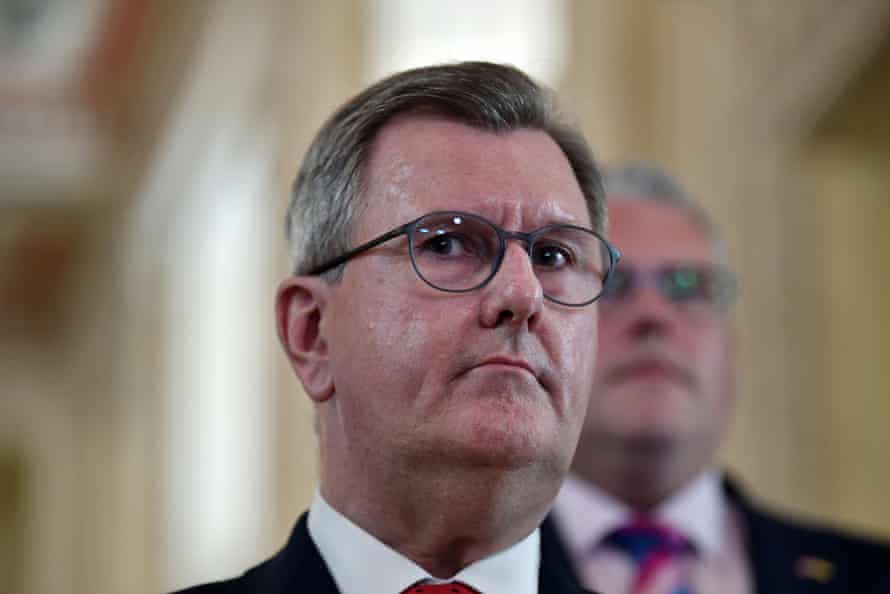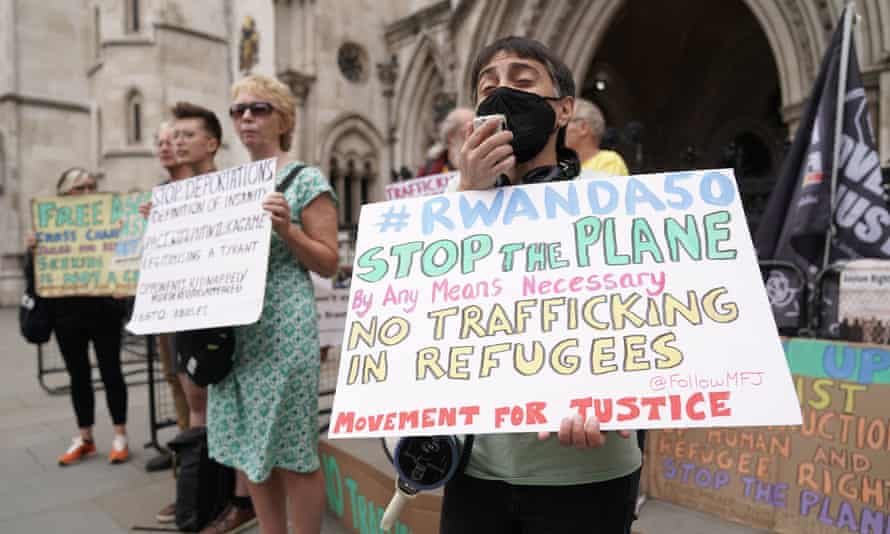
Truss: Northern Ireland Bill ‘reasonable [and] practical measures for problems’
Foreign secretary Liz Truss has made comments alongside the bill being published. She said it will support the Good Friday agreement, and measures were “reasonable [and] practical”.
She said: “This bill will uphold the Belfast (Good Friday) Agreement and support political stability in Northern Ireland. It will end the untenable situation where people in Northern Ireland are treated differently to the rest of the United Kingdom, protect the supremacy of our courts and our territorial integrity.
“This is a reasonable, practical solution to the problems facing Northern Ireland. It will safeguard the EU Single Market and ensure there is no hard border on the island of Ireland. We are ready to deliver this through talks with the EU. But we can only make progress through negotiations if the EU are willing to change the protocol itself – at the moment they aren’t. In the meantime the serious situation in Northern Ireland means we cannot afford to allow the situation to drift.
“As the government of the whole United Kingdom, it is our duty to take the necessary steps to preserve peace and stability.”
Bill could threaten Northern Ireland’s firms’ access to single market
The European Commission vice president Maros Šefčovič has said that the EU views the latest plans from the UK with “significant concern”. Earlier on Monday he warned that if the UK followed through with the threatened bill it would “damage trust” between the two.
Speaking at the commission’s headquarters in Brussels, he said the EU would look at restarting “infringement proceedings” against the UK which have been on hold since September 2021.
“It is with significant concern that we take note of today’s decision by the UK Government to table legislation disapplying core elements of the protocol. Unilateral action is damaging to mutual trust.
“In particular, the protocol provides business operators in Northern Ireland with access to the EU single market for goods. The UK Government’s approach puts this access – and related opportunities – at risk.
“Our aim will always be to secure the implementation of the protocol. Our reaction to unilateral action by the UK will reflect that aim and will be proportionate.”
Truss: Northern Ireland Bill ‘reasonable [and] practical measures for problems’
Foreign secretary Liz Truss has made comments alongside the bill being published. She said it will support the Good Friday agreement, and measures were “reasonable [and] practical”.
She said: “This bill will uphold the Belfast (Good Friday) Agreement and support political stability in Northern Ireland. It will end the untenable situation where people in Northern Ireland are treated differently to the rest of the United Kingdom, protect the supremacy of our courts and our territorial integrity.
“This is a reasonable, practical solution to the problems facing Northern Ireland. It will safeguard the EU Single Market and ensure there is no hard border on the island of Ireland. We are ready to deliver this through talks with the EU. But we can only make progress through negotiations if the EU are willing to change the protocol itself – at the moment they aren’t. In the meantime the serious situation in Northern Ireland means we cannot afford to allow the situation to drift.
“As the government of the whole United Kingdom, it is our duty to take the necessary steps to preserve peace and stability.”
The 20-page bill, now live on the government’s website, says that it will give ministers the power to make new laws on the protocol which governs trade between Great Britain and Northern Ireland. It had its first reading in the Commons earlier this evening.
The bill in full can be found here.
The key part of the government’s plans are that businesses exporting to Northern Ireland can choose themselves whether to follow EU or UK standards, which are expected to widen.
Goods for Northern Ireland will then be able to use a green lane, which will mean they will get fewer customs checks. Those destined for EU countries will have to follow a red lane.
The European Court of Justice will also no longer have a say in trade disputes, and it will instead fall to an independent arbitration process.
Goverment publishes Northern Ireland Protocol bill

Rowena Mason
Liz Truss risked a trade war with the EU and accusations of lawbreaking as she published legislation that would allow exports from Britain to Northern Ireland to follow either UK or EU standards and checks.
Publishing the Northern Ireland protocol bill, Truss said the legislation would “fix” issues with the post-Brexit protocol by easing checks for firms selling goods from Britain destined for Northern Ireland rather than the EU. It would also scrap the European court of justice as the arbiter of trade disputes and move to an independent mechanism.
However, the EU, legal experts and even some Conservative MPs have warned that the move is illegal under international law as it gives ministers the powers to disapply parts of the protocol unilaterally, without the agreement of Brussels.

Andrew Sparrow
And Sir Jeffrey Donaldson, the DUP leader, told a briefing at Stormont that the Northern Ireland bill was needed because the EU’s negotiating mandate was “so limited” it could not agree to the changes that were required to the protocol. He went on:
We believe it is right that the UK Government takes this action, the UK Government has a primary responsibility to protect the integrity of the United Kingdom and its internal market, whilst at the same time making reasonable proposals that offer protection to the European Union and their single market,” he said.
We will consider these proposals against our seven tests to determine if they meet what is required to achieve the objectives, which is of course to restore Northern Ireland’s place within the UK internal market, to remove the barriers to trade within the UK, and to enable us then to restore the political institutions and protect the principle of consensus, cross-community consensus which is at the heart of the Belfast Agreement and of how the political institutions operate.
Donaldson also denied that his party was now under pressure because of its stance on the protocol. He said:
I’m not under any pressure. We have strong support from across unionism for the stand that we are taking. I believe that our pressure has brought about what we see today with this bill being published.
That is all from me for tonight. My colleague Harry Taylor is taking over now.

Michelle O’Neill, the Sinn Féin leader in Northern Ireland, has said the Northern Ireland protocol bill being published today is “in clear breach of international law”.
The bill still has not been published, but it is expected within the next hour.
Keir Starmer is facing a revolt by party members in Stroud where 130 activists have signed a letter saying that Doina Cornell, the Labour leader of Stroud district council, should be allowed on the shortlist when the party selects its parliamentary candidate for the town, the Stroud Times reports. In their letter to Starmer and David Evans, the party’s general secretary, the members said:
The decision to prohibit Doina from standing is wrong and we fear will fatally damage our chances of regaining Stroud for Labour; surely something that should be our priority.
Cornell was reportedly blocked from being a candidae because of concerns about her social media activity in the past, although last week she said she had not been given specific reasons for the ban.
A Conservative, Siobhan Baillie, won Stroud at the last election with a majority of 3,840, but the seat was Labour from 1997 to 2020, and won by Labour again in 2017.
This is from ITV’s Paul Brand on the plan for the first flight taking asylum seekers to Rwanda to leave tomorrow.
Understand the first flight carrying asylum seekers from UK to Rwanda will take off tomorrow evening and arrive in Kigali on Weds.
Have spent the day filming the kind of conditions they can expect, including at this camp an hour from the capital which already houses refugees. pic.twitter.com/HEmV7Apexo
— Paul Brand (@PaulBrandITV) June 13, 2022
Court of appeal says it has no grounds to overturn high court’s decision not to block Rwanda relocation for asylum seekers
Court of Appeal judges have rejected a last-ditch legal bid to block the first flight due to relocate asylum seekers to Rwanda under a controversial government policy, PA Media reports.
The Public and Commercial Services union (PCS), which represents more than 80% of Border Force staff, and charities Care4Calais and Detention Action challenged a high court judge’s refusal to grant an injunction on Friday, which meant the first flight to the east African country could go ahead on Tuesday.
Lawyers for the three groups and one person due to be removed asked for the injunction to prevent the 11 people now due on Tuesday’s flight from being taken to Rwanda until the full hearing of whether the policy is lawful next month.
Raza Husain QC argued that the judge who refused to block the flight on Friday, Mr Justice Swift, had wrongly decided the “balance of convenience”.
But, following an urgent hearing in London on Monday, three senior judges dismissed the appeal, saying there was no error in the decision of Mr Justice Swift.
Lord Justice Singh, sitting with Lady Justice Simler and Lord Justice Stuart-Smith, said Mr Justice Swift had “conducted the balancing exercise properly” and did not err in principle nor in the approach he took.
He added: “He weighed all the factors and reached a conclusion which he was reasonably entitled to reach on the material before him. This court cannot therefore interfere with that conclusion.”
The Home Office has defended the policy and the prime minister has said the government had anticipated “a lot of teething problems” with the policy, but said the move is necessary to stop illegal people-smuggling rackets on either side of the Channel.
Rory Dunlop QC, for the department, told the court earlier on Monday: “The flight tomorrow is important. This is a policy which is intended to deter dangerous and unnecessary journeys, journeys from safe third countries by people who do not need to make that journey to be safe, they can claim in France or wherever it is. This is a policy that if it works, could save lives as well as disrupting the model of traffickers.
“Even if we are just talking about cancelling a flight tomorrow, there is prejudice to the public interest, to the enactment of decisions that may have that deterrent effect.”
The high court heard the UN refugee agency, the UNHCR, has multiple concerns about the system in Rwanda, including discriminatory access to asylum, a lack of legal representation and other “deep-rooted structural problems”.
On Monday, Dunlop said: “The secretary of state has listened and seriously considered the concerns raised by the UNHCR and has deliberately negotiated arrangements to provide assurances in relation to those concerns.”
A second case is being heard in the high court on Monday afternoon after Asylum Aid, a refugee charity, applied for an urgent interim injunction to stop the Government flying migrants to Rwanda.
According to the Telegraph’s Christopher Hope, the European Research Group, the Tory caucus who pushed for the hardest version of Brexit during the withdrawal negotiations, is reconvening its ‘star chamber’ of Eurosceptic lawyers to vet the Northern Ireland protocol bill.
* Today’s Chopper’s Politics Newsletter *
European Research Group is withholding support for Boris Johnson’s plans to overhaul Northern Ireland Protocol.
The ERG has reformed the ‘star chamber’ to go through them line by line.
Its conclusions will be published later this month. pic.twitter.com/g0Uai8YFox— Christopher Hope📝 (@christopherhope) June 13, 2022
The barrister Matthew Scott was tweeting as Lord Justice Singh delivered the judgement in the appeal against the decision by the high court on Friday not to grant an injunction prevention the removal of some asylum seekers to Rwanda tomorrow. Here are some of his tweets.
Merits of the underlying plicy are not for the courts, says Singh. Only job of the courts is to decide if the scheme is lawful.
— Matthew Scott (@Barristerblog) June 13, 2022
Merits of the underlying plicy are not for the courts, says Singh. Only job of the courts is to decide if the scheme is lawful.
— Matthew Scott (@Barristerblog) June 13, 2022
I’ve done my best to tweet this, but it’s full of errors. Basically, it boils down to Swift J made no identifiable mistakes so the Court of Appeal won’t intervene. https://t.co/mZIAF4e5qF
— Matthew Scott (@Barristerblog) June 13, 2022
We can’t decide today if the scheme is lawful. There will be a full hearing in July. We are an appellate court. We have to decide if the judge’s decision was one which was not reasonably open to him.
— Matthew Scott (@Barristerblog) June 13, 2022
The individual removal decisions were challenged in High Court on 7 Grounds:
1. SoS’s determination that Rwanda is a safe country is unreasonable (that’s a paraphrase, as is most of this thread)
2. Malaria prevention
3. Art 3 of ECHR— Matthew Scott (@Barristerblog) June 13, 2022
4. Ultra Vires by unlawful criminalisation of refugees
5. Ultra vires 1992 Act, because Rwanda won’t discharge rights under Refugee Convention
6. Failure of Sos to issue guidance
7. Failure of SoS to consider representations.— Matthew Scott (@Barristerblog) June 13, 2022
Application is to prevent removal pending the final hearing of the claim.
— Matthew Scott (@Barristerblog) June 13, 2022
Judge considered was serious isue on 1,2 3 & 5. Considered where the “balance of convenience” fell. Judge felt that it did not favour a general or individual injunctions.
— Matthew Scott (@Barristerblog) June 13, 2022
Permission to appeal to Supreme Court is refused.
That’s it from the Court of Appeal.
— Matthew Scott (@Barristerblog) June 13, 2022
And here is Scott’s summary. Swift J is Mr Justice Swift, who delivered the high court judgment on Friday.
I’ve done my best to tweet this, but it’s full of errors. Basically, it boils down to Swift J made no identifiable mistakes so the Court of Appeal won’t intervene. https://t.co/mZIAF4e5qF
— Matthew Scott (@Barristerblog) June 13, 2022
These are from Danny Shaw, the home affairs commentator, on this afternoon’s court of appeal judgment.
NEW Refugee campaigners have failed in a new legal attempt to stop an asylum removal flight to Rwanda after Court of Appeal upheld a decision by the High Court
— Danny Shaw (@DannyShawNews) June 13, 2022
Permission to appeal refused.
— Danny Shaw (@DannyShawNews) June 13, 2022
Very hard to see now how tomorrow’s Rwanda flight can be stopped….
— Danny Shaw (@DannyShawNews) June 13, 2022
Court of Appeal ruling was emphatic. Fully backed Mr Justice Swift’s judgment from Friday.
— Danny Shaw (@DannyShawNews) June 13, 2022
But of course – this was not a full hearing about the substance & legality of Rwanda removals policy : that will come at the High Court in July. And that decision – whichever way to goes – will be subject to an appeal as well. This is going to take months to resolve.
— Danny Shaw (@DannyShawNews) June 13, 2022
Court of appeal rejects last-minute bid to stop asylum seekers being sent to Rwanda tomorrow
PA Media has just snapped this.
Court of appeal judges have rejected a last-ditch legal bid to block a flight due to relocate asylum seekers to Rwanda on Tuesday.
I will post more on the judgment shortly.
This is from Anton Spisak, Brexit specialist at the Tony Blair Institute thinktank, on Boris Johnson’s comment this morning about the Northern Ireland protocol bill. (See 9.58am.)
Johnson describing a near-complete rewrite of the Protocol though primary legislation as “a trivial set of adjustments” and “a bureaucratic change” is utterly dishonest. At least own your bloody bill, ffs.
— Anton Spisak (@AntonSpisak) June 13, 2022
Keir Starmer is widely been by voters as boring, according to polling research published today.
NEW @JLPartnersPolls in today’s @thesun
We asked a nationally representative sample of 2,000 people what they think about Keir Starmer.
Of all responses, 50% were negative, 24% neutral, 26% positive. The words most commonly used are below. pic.twitter.com/OsSl57guXS
— James Johnson (@jamesjohnson252) June 13, 2022
James Johnson of JL Partners used to work for Theresa May in Downing Street, but he is a reputable pollster and he is happy to point out that equivalent polling on Boris Johnson is far worse.
And however bad the poll may seem for Starmer, at the moment all that matters is who is least unpopular. Here is the same exercise for Boris Johnson back in April. (3/3) https://t.co/NCqKjTx8ox
— James Johnson (@jamesjohnson252) June 13, 2022
In a comment on his findings for the Sun, Johnson says that being seen as boring by the voters has some advantages. He explains:
Being seen as a bore has clear downsides. It means voters do not associate the Labour leader with an exciting vision for the future.
They often criticise him for not seeming to have any ideas.
But it also has an upshot. In the focus groups I run, Starmer is seen as so dull that voters find it hard to care about even the most negative stories about him – such as his beers in Durham.
While Corbyn was seen as weak, and Ed Miliband as a joke, Starmer is met with a shrug.

The withdrawal of the national Covid testing scheme is “dragging on UK GDP data”, Treasury minister John Glen has told MPs. Responding to a Commons urgent question on the growth figures showing the economy shrinking in April, and echoing the argument used by No 10 (see 1.56pm), Glen said:
Like other advanced economies, the UK is affected by global economic challenges including the unprovoked Russian invasion of Ukraine.
As the chancellor said a few weeks ago, a perfect storm of global supply shocks is rolling through our economy simultaneously. At the same time, the impact from the wind-down of the national Covid testing scheme is dragging on UK GDP data.
Overall, the figures published by the Office for National Statistics (ONS) this morning for April show that output fell 0.3% on the month, with the services sector falling by 0.2% and production and construction declining by 0.6% and 0.4% respectively.
As the ONS themselves note, the fall in GDP on the month is driven by the impact of the wind-down of the NHS Covid testing programme. Testing volumes fell 70% from March to April which, alongside the impact from vaccines, detracted 0.5 percentage points from GDP growth in April.
Pat McFadden, the shadow chief secretary to the Treasury, claimed Britain was “going backward” under the Conservatives. He said:
Inflation at nine per cent, tax promises broken, trade deficit £24bn, the pound falling against the dollar, the director general of the CBI saying business leaders are in despair. The OECD forecasting that next year the UK will have the lowest growth of any G20 economy with the sole exception of Russia. This is what the government is presiding over. Britain is going backward under the Conservatives.


